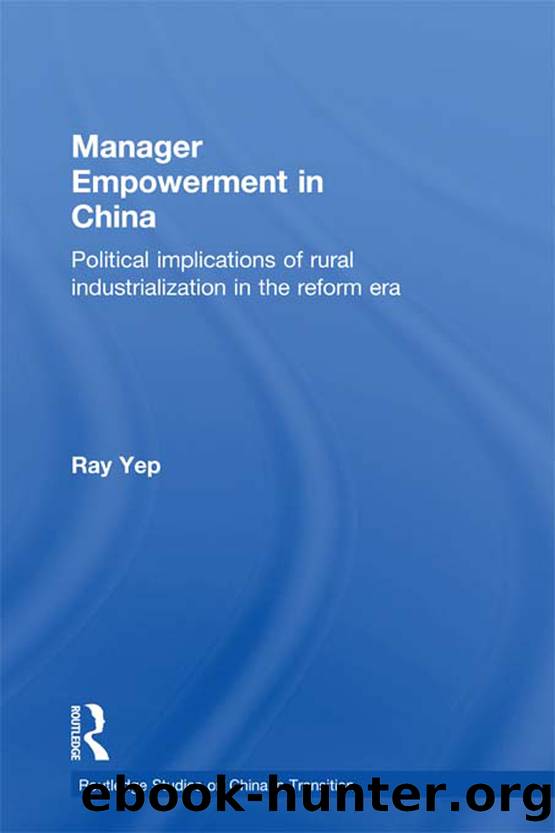Manager Empowerment in China by Ray Yep

Author:Ray Yep [Yep, Ray]
Language: eng
Format: epub
ISBN: 9781280022395
Goodreads: 16747267
Publisher: Taylor & Francis Group
Published: 2003-03-13T00:00:00+00:00
Control of staffing decision
The importance of personnel control needs no explanation. As the appointment of managers has been examined previously, this section will concentrate on management of the general staff. More specifically, two major areas of personnel management will be the focus: control over the size of the establishment, and the appointment and dismissal of staff. In general, although there is a restriction on the size of the labor force, managers enjoy substantial freedom in internal personnel matters.
The township government maintains tight control over the size of the labor force employed by enterprises. An upper limit is imposed for each enterprise and any increase has to be approved by the ETC in advance. In addition, the mix of staff is under the control of the local administration. The creation of new posts, especially those in the management category, has to be approved too. The ETC is thus also involved in determining the organizational structure of the company, as internal restructuring always implies the creation or removal of posts. The rationale for tight control in this area is simple; it is a reflection of the local government's primary concern of over enterprise resources. The size of an enterprise's labor force is directly related to its expenditure on wages and bonuses. Thus, a tight grip on the growth of an enterprise's labor force is essential for maintaining control over enterprise finances.
Managers certainly have a role to play in determining the upper limit. Their recommendations on the necessary increase in labor input are, in most cases, respected. At the beginning of each financial year, managers have to submit a labor plan for their enterprises, which contains an estimate of the labor force needed and proposals for changes in the personnel management structure. These proposals have to be submitted before economic targets for their enterprises are finalized. Amendment afterwards is difficult, as it affects the original distribution of resources. For this reason, changes in personnel planning usually have to wait until the next financial year.
Managers' limitations in expanding staff size are well compensated by their high level of discretion in the choice of specific staff. In the appointment of both management and ordinary staff, managers played a dominant part. Managers enjoy substantial freedom in choosing the core of the management team. Local officials call the existing practice the âcabinet systemâ (neiguozhi) â once the manager has been appointed, he or she is free to choose his or her own management team. In principle, the appointment of major management personnel, including deputies, departmental managers and chief accountants is within the jurisdiction of the ETC. However, in practice, the manager's choice is always respected, though the township ETC has to be informed of any major change in personnel.
The township government has an even more relaxed attitude toward the appointment of ordinary staff. Within the limits laid down by the ETC, the manager basically has a free hand in deciding whom to employ. Workers can be recruited through the county labor bureau, or via the market. As
Download
This site does not store any files on its server. We only index and link to content provided by other sites. Please contact the content providers to delete copyright contents if any and email us, we'll remove relevant links or contents immediately.
Spell It Out by David Crystal(35853)
Life for Me Ain't Been No Crystal Stair by Susan Sheehan(35539)
Cecilia; Or, Memoirs of an Heiress — Volume 1 by Fanny Burney(32074)
Cecilia; Or, Memoirs of an Heiress — Volume 3 by Fanny Burney(31469)
Cecilia; Or, Memoirs of an Heiress — Volume 2 by Fanny Burney(31419)
The Great Music City by Andrea Baker(30796)
Professional Troublemaker by Luvvie Ajayi Jones(29425)
We're Going to Need More Wine by Gabrielle Union(18641)
Twilight of the Idols With the Antichrist and Ecce Homo by Friedrich Nietzsche(18306)
The Secret History by Donna Tartt(18210)
All the Missing Girls by Megan Miranda(14785)
Cat's cradle by Kurt Vonnegut(14776)
Pimp by Iceberg Slim(13797)
Bombshells: Glamour Girls of a Lifetime by Sullivan Steve(13698)
Fifty Shades Freed by E L James(12924)
Talking to Strangers by Malcolm Gladwell(12888)
Norse Mythology by Gaiman Neil(12859)
The Social Justice Warrior Handbook by Lisa De Pasquale(11957)
Underground: A Human History of the Worlds Beneath Our Feet by Will Hunt(11846)
